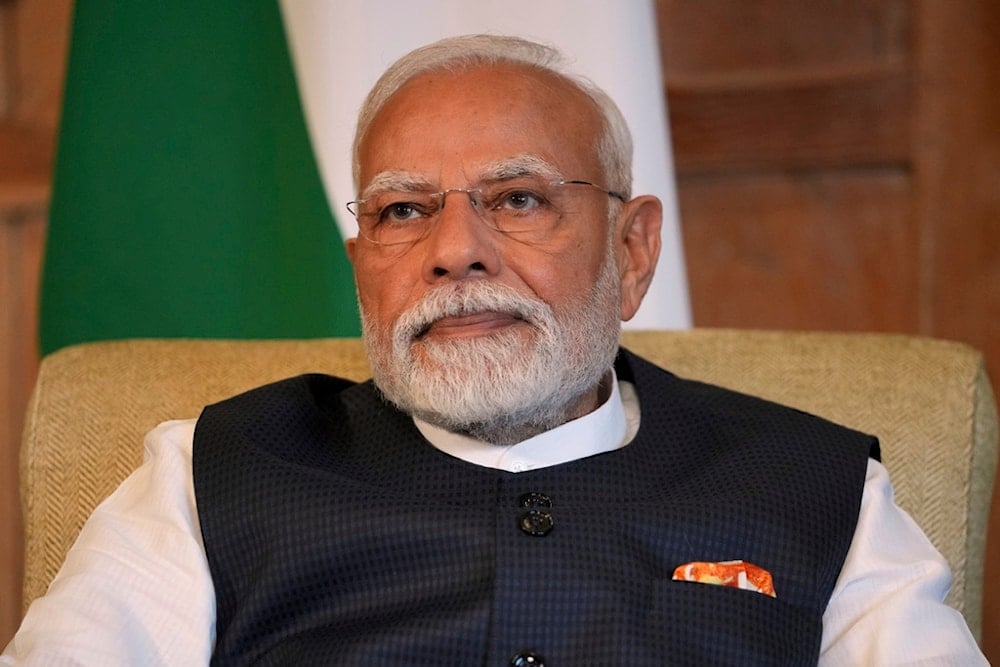Trump doubles tariffs on India over Russian oil despite partnership
The US hiked tariffs on India to 50% over Russian oil purchases, with Washington citing trade imbalance and energy concerns despite ongoing partnership.
-

Prime Minister Narendra Modi of India listens to Britain's Prime Minister Keir Starmer as they meet for bilateral talks at Chequers near Aylesbury, England, Thursday, July 24, 2025. (AP)
The United States has reaffirmed its view of India as a strategic partner, even as it imposes steep new tariffs in response to New Delhi's continued purchase of Russian oil. The remarks came Thursday from US State Department Principal Deputy Spokesperson Tommy Pigott, following President Donald Trump’s executive order a day earlier.
Trump signed an order on Wednesday raising tariffs on Indian imports by an additional 25%, doubling the total trade levy to 50%. The move is Washington’s most explicit economic retaliation yet over India’s ongoing energy ties with Moscow.
"India is a strategic partner with whom we engage in a full and frank dialogue. That will continue," Pigott said during a State Department briefing. "Like anything in foreign policy, you are not going to align 100% of the time on everything."
He stressed that President Trump had made his position clear. “The President has been clear about the concerns that he has with the trade imbalance and the concerns he has with India purchasing Russian oil,” Pigott added.
Sanctions inbound on Russia?
Meanwhile, the US Department of State on Thursday refused to comment on whether the US would impose sanctions on Russia on August 8 due to the end of US President Donald Trump's timeline for a deal on Ukraine.
"I'm not going to speculate from here," State Department Principal Deputy Spokesperson Tommy Pigott told a briefing.
Trump against Indian trade with Russia
Trump said the United States was is nearing an agreement with China to extend their current trade truce, even as he moved to significantly raise tariffs on Indian exports in response to New Delhi’s continued purchases of Russian oil, a decision that has drawn sharp criticism from India.
In a post on social media Monday, Trump accused India of profiting from the war in Ukraine by purchasing large volumes of Russian oil and reselling it on global markets.
“India is not only buying massive amounts of Russian Oil, they are then, for much of the Oil purchased, selling it on the Open Market for big profits,” Trump wrote. “They don’t care how many people in Ukraine are being killed by the Russian War Machine. Because of this, I will be substantially raising the Tariff paid by India to the USA.”
While Trump did not provide details on the scale of the new tariff hike, his comments come just a week after announcing a 25% tariff on Indian goods, one of the steepest rates applied to any major economy. He also warned of further penalties should India continue its oil trade with Moscow.
India refuses to yield on Russian oil
Russian news outlet Izvestia published an analysis on Saturday, detailing that tensions between India and the West have escalated over New Delhi's continued reliance on Russian oil, with both the United States and European Union ramping up punitive measures. Despite growing pressure, India remains unlikely to sever energy ties with Moscow due to its deep dependence on discounted crude to fuel economic growth.
India finds itself in a complex position. It maintains a trade surplus with Western countries but suffers a deficit in exchanges with Russia and Gulf oil exporters. Combined with Trump's broader grievances about unfair trade practices, this imbalance makes India an attractive target for US pressure.
However, New Delhi's protectionism stems from structural vulnerabilities. Its rapidly expanding economy still relies heavily on affordable foreign oil. The prospect of US tariffs threatens a development model based on exporting low-cost goods to Western markets as a substitute for Chinese imports.
While India may seek to soften the impact through negotiation, its overall exposure is limited. Washington is a key partner, but not indispensable, and India may be prepared to weather trade friction, especially since Trump had signaled tariff intentions since the start of his second term.
Shortly after Trump's announcement, several state-owned Indian refiners, Indian Oil Corp, Hindustan Petroleum, Bharat Petroleum, and Mangalore Refinery, reportedly halted purchases of Russian crude, opting instead for spot market deals with suppliers in the UAE and West Africa. These entities collectively manage about 60% of India's refining capacity.

 4 Min Read
4 Min Read








